During the recent WN Conference in Belgrade, we had a chance to speak with Raphaël Colantonio, creative director of WolfEye Studios and founder of Arkane. Check out our interview with one of the industry’s most prominent creative minds for a quick dive into the immersive sim genre and Raphaël’s approach to game development.
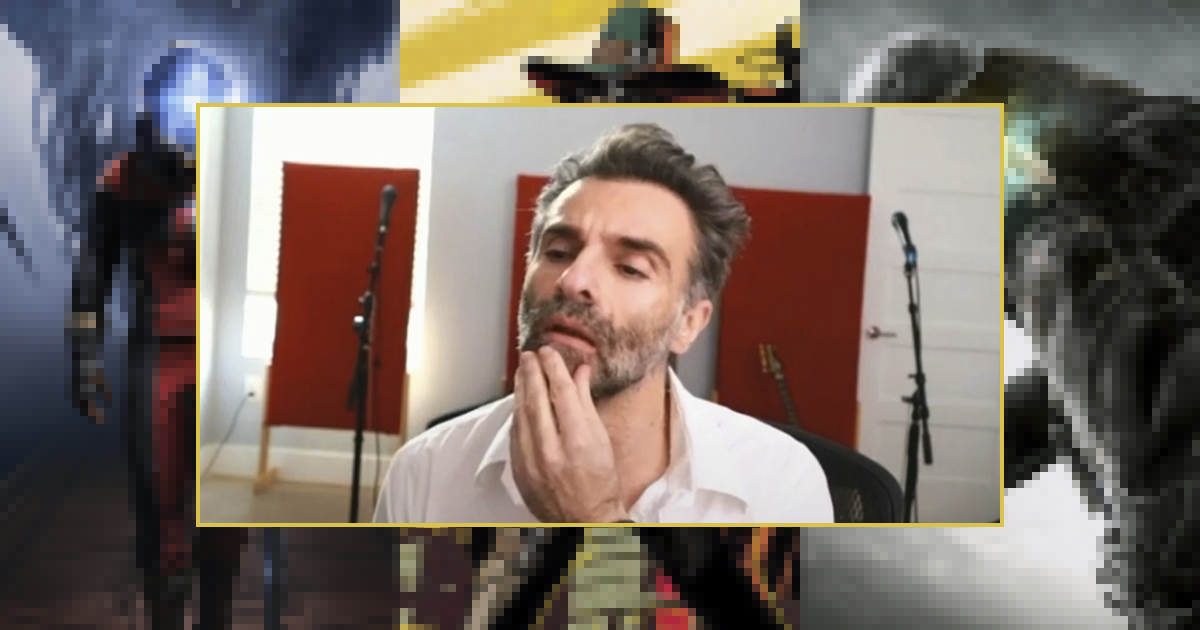
Raphaël Colantonio
Oleg Nesterenko, Game World Observer: I believe that one game design concept has grown to be almost synonymous with Raphaël Colantonio and Arkane, which is “Immersive sim,” so let’s start with that. Since there is not a lot of consensus, even within the game dev community, on what this label means, could you let us into your own understanding of what exactly immersive sims are?
Raphaël Colantonio, president and creative director of WolfEye Studios: First of all, I would never claim that I alone am behind immersive sims; I think it’s a group of like-minded people. It probably started with the likes of Doug Church, Harvey Smith, and Warren Spector. But I’m certainly part of this group, having been touched by Ultima Underworld back then, which was probably the very first immersive sim from Doug Church.
Anyway, when I talk about immersive sims, I mean a set of values where the world has to be cohesive and you have to feel like you’re not on a movie set. Instead, you should feel that everything around you is real: the building, the behind of the building, the top of it.
Immersive sims should allow for decision-making, while the story needs to give players a sense of authorship. Simulation is also very important, so instead of scripting and orchestrating everything, those games tend to set up a frame of possibilities brought to life through tools, AI, and bits of stories. There always have to be multiple solutions, including ones that the player might make for themselves, so you basically let the player cheat the game using the tools available.
All of this combined creates a very memorable personal experience where players feel like they experienced a real situation. Part of this is illusion, and of course we blend scripted things with simulation. But not every immersive sim needs to have a nonlinear story and meet all the criteria I mentioned. It’s more about a set of values that allows a game to get that Immersive Sim stamp, which is in any case pretty arbitrary.
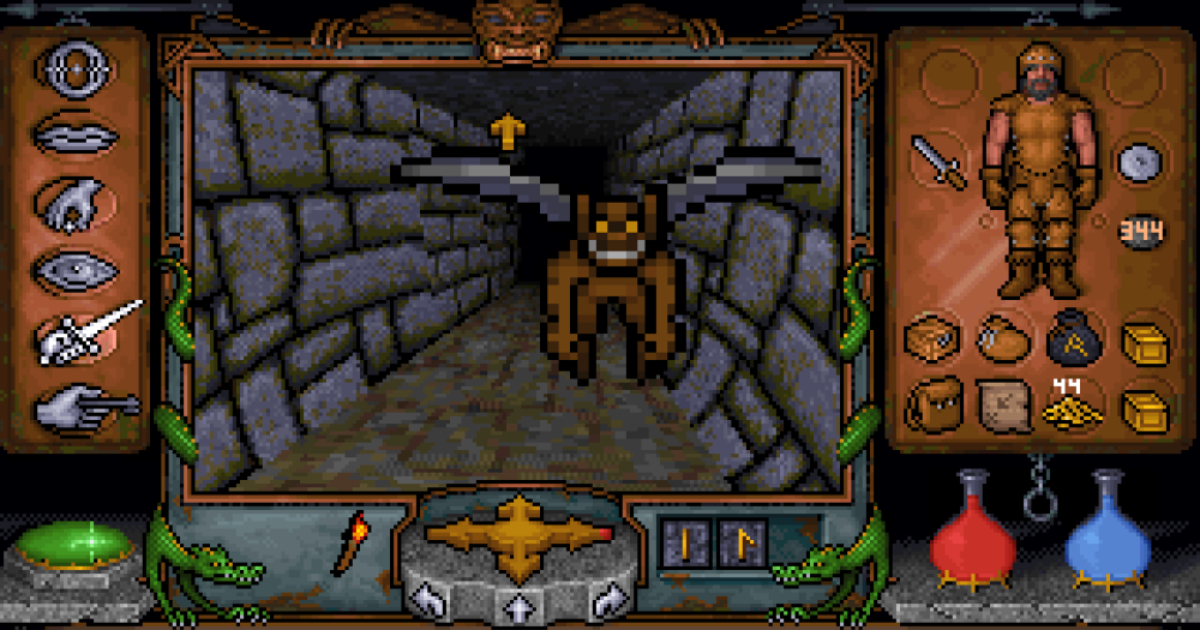
Ultima Underworld: The Stygian Abyss
Would you say that some genres are more conducive to implementing those qualities that make up immersive sims than others? For example, Prey is a first-person shooter, but still falls under the criteria you mentioned.
Raphaël: Prey is definitely there because it has more verbs, more axes of interactions than traditional shooters. We always love to make games where everything is a little sandboxy. You create a nonlinear environment and then give players tons of tools so they can have vertical mobility or weird context modifiers like stopping time, changing gravity — anything that is designed to modify the rules rather than just to kill things. We did that with Dishonored a lot.
RPGs often have an immersive sim vibe to them because of their inherent quality of allowing you to play the way you want. But again, Diablo doesn’t adhere to that immersive sim mentality at all, instead focusing on a different aspect of the RPG genre. So it’s all a little blurry and arbitrary, and it’s up to debate.
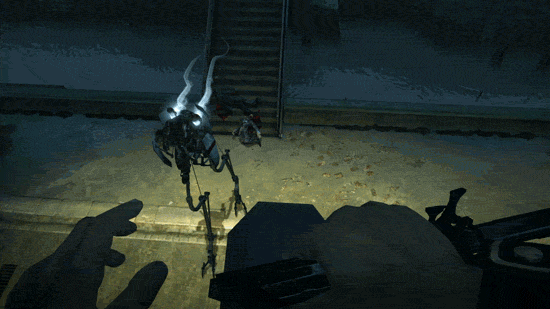
Dishonored
Since immersive sims are very systems-heavy, what does it take to design these kinds of games? I suppose that all hell breaks loose when you try to come up with those systems before you can make them work in a balanced and cohesive way.
Raphaël: Absolutely, and this applies not only to all the systems, but also to other layers of the game, such as the story. We can’t really do the story in a simulated way, so we have to pre-author things to account for moments when players might do something that seems impossible. That’s where we blur the line between script and simulation, and then the illusion comes into play.
Making these games is very counterintuitive to the big bulk of the industry and the common practices because it can terrify producers and anyone who likes to move forward with decisions set in stone, without ever looking back. Immersive sims really force you into accepting that you don’t know everything about your game.
You’re going to make things that are going to break the game all the time. So it’s a bit like trying to make a salad with tons of ingredients and constantly changing them. One of them may be extremely weird or strong and change the entire recipe, and you have to go back to all the other ingredients, making sure they still work with this thing. It’s exhausting. It’s scary because you’re holding your breath for the entire duration until Alpha, pretty much.
The game, in a way, reveals itself to you. When we start an immersive sim project, we don’t have a clear vision of what we’re doing. Instead, it’s more about intuition and outlining things we’d like players to explore. So you need a team that really trusts the process.
The same is probably true in music or cooking. You make mistakes but then go, “Oh my God, this is actually incredibly good!” I think the scary element is that you have to leave some space for those opportunities to arise. And if you make a game that is alive with its independent systems, then there are more chances that these opportunities are going to happen. But that process is scary.
It’s a miracle, actually, that a big company such as Bethesda was so understanding of this kind of approach for this long because what you are saying is so artistic and chaotic and fundamentally anti-business-y. How do you even uphold any sort of order to this creative chaos?
Raphaël: Initially, we had to hide this chaotic approach. It’s a trick, you know. You don’t want to say that to the publisher because otherwise they think you don’t know what you’re doing. But once you pull it off once or twice, then people think, “Oh yeah, that’s cool. If that’s the process, then okay.”
But, to be fair, Bethesda itself created games like Skyrim. You can argue whether they are immersive sims or not, but they definitely have a strong layer of simulation that has created some of the best of Skyrim. Remember those videos with the bucket on the shopkeeper’s head and other stuff where it’s just a result of the simulated approach? Before being a publisher, Bethesda was a developer, so they come from a developer mindset. That’s why I think, in the specific case of Bethesda, they were pretty friendly to that kind of approach. I don’t think they ever fought us on that, which was part of the reason why we gladly joined forces with them back in the day.
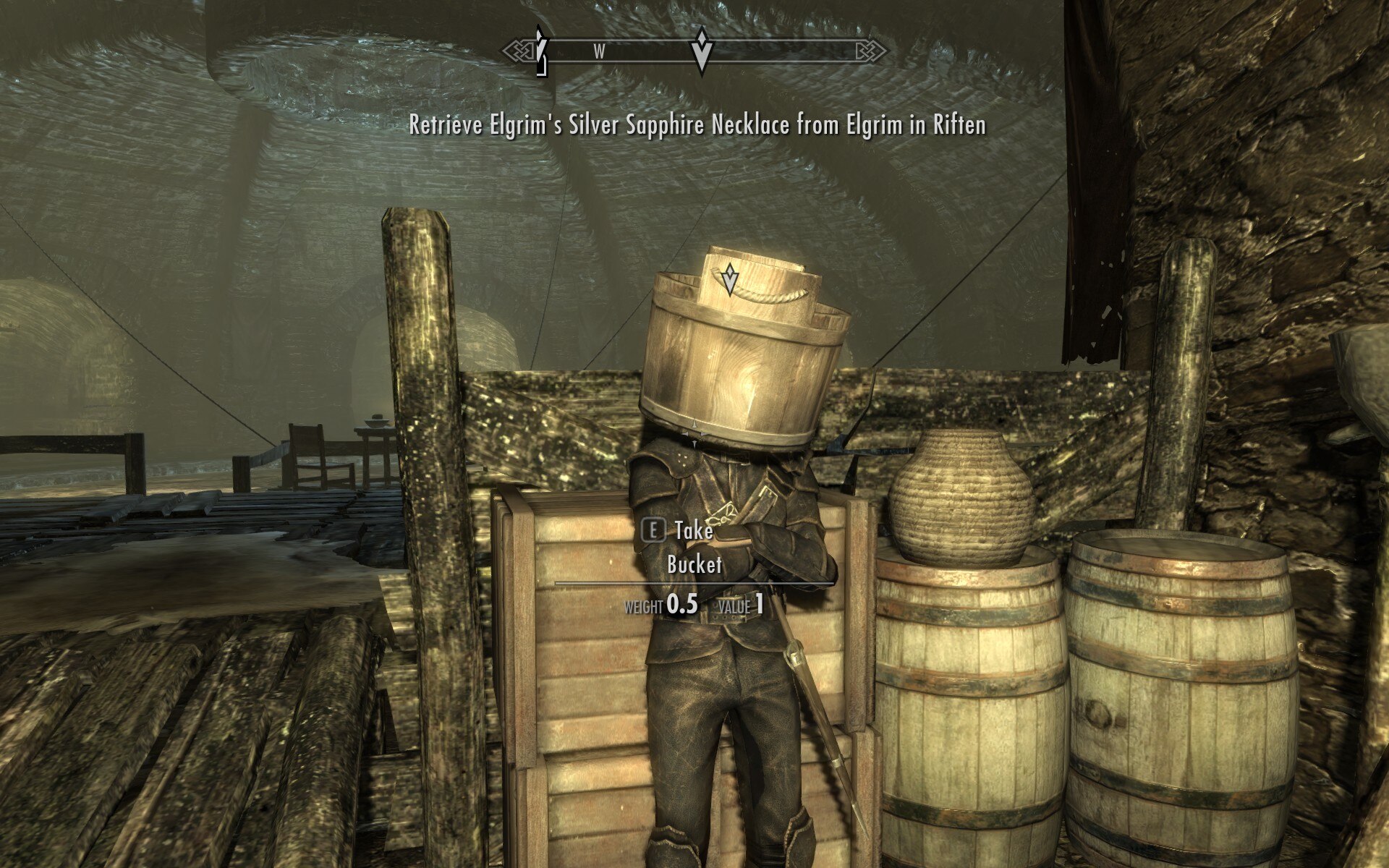
The Elder Scrolls V: Skyrim (Screenshot by Pandarmour)
Game development is obviously an iterative process, but immersive sims require you to go even deeper, right? I guess there is a period in the life cycle of a game where it’s an utter mess and you cannot be convinced that it’s ever going to come together. And you only act on faith, I suppose?
Raphaël: Yeah, you really need to have faith. Sometimes it can be frustrating because it feels like we always make the same mistakes, but those mistakes are necessary to reach the destination.
For example, we always have a lot of legacies in our games because of this iterative process: elements, mechanics, and plot twists from years ago that might feel off for a very long time but then suddenly, when their moment comes, they just make sense. And you go, “Oh my God, so glad we kept this element because now we have this super unique thing that we would never have come up with before!”
And again, I’m sure it’s similar to a lot of creative processes like music. For example, you move a piece of sequence somewhere by mistake. It can go on the wrong track, one beat too late, and then it comes out incredible. So I think it’s important to leave space for mistakes, weird legacies, things that you hang on to and that you modify based on the new context. It all comes down to that ability that we have as creatives to be okay with the fact that the random sometimes is going to help you, and then your talent is to recognize the opportunity as opposed to necessarily creating everything from scratch.
People might have some insecurity about that, thinking, “If it’s not deliberate from the get go, if I don’t have this vision, if the publishers don’t see a game design which is perfect, then this is not going to be a good game, then you don’t know where you’re going.” I believe that part of it is improvisation, and part of it is recognizing when an amazing opportunity, a creative nugget, presents itself to you.
Now that you do your own thing at WolfEye, you’re clearly enjoying a much smaller-scale production than you used to at Arkane under Bethesda. It comes with all sorts of restrictions, but those restrictions are also instructive, informing some of your choices, right?
Raphaël: I think the most terrifying thing for me would be if a big company approached me and said, “Raph, you have an infinite budget, make the best game ever.” That probably would lead to a game that never ships because you would constantly redo everything. Nothing would be good enough and you would never try to find shortcuts.
For example, there was a monster in Prey called the Poltergeist. We were running out of time, and there was no way we could do animation for a new monster. In this case, I came up with this idea, “What if we make an invisible monster and play with physics, so it just appears occasionally with one simple animation and then disappears again.” That became “creative” because we would never have come up with this idea if we had had an infinite budget as some big teams. So I really value that.
I really believe in constraints, and I’m definitely not the only one saying that. Lots of people believe that constraints always spawn creativity.
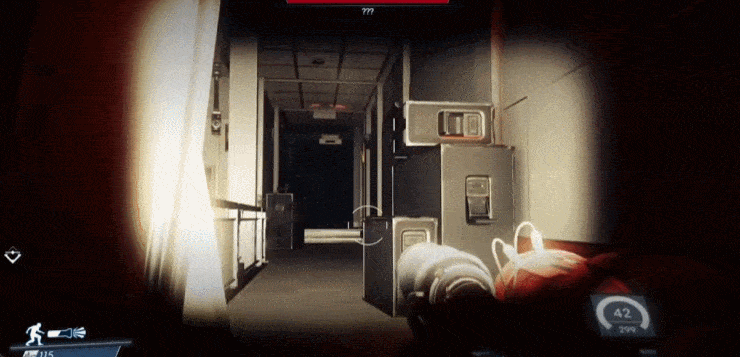
Prey (2017)
Going back to WolfEye, was detaching from the first-person perspective one of those constraints-motivated decisions on Weird West?
Raphaël: To be perfectly transparent, there were different motives for making a third-person remote camera with an isometric view.
The first reason was cutting costs [compared to a more expensive first-person view], for sure. But we also thought that we had already been making first-person games, solving the same problems over and over, for the past 15 years of our lives, if not more. “Do we see our feet? How do we swing the sword in first person? What type of animation do we use?” So we’re tired of it. I think [WolfEye CEO] Julien Roby and I wanted to explore what we could do in the vein of the original Fallout or Ultima games. This was attractive because of the fantasies we had as young gamers.
While we are on the subject of constraints, clearly bigger corporations can offer bigger marketing budgets. But do you maybe feel that you, as a person and a game developer, have become a brand in your own right and have already unlocked the market niche that is there craving for all the new games to come from you?
Raphaël: To some degree, yeah. But I don’t think we can compare it to some of the huge franchises and genres that have way bigger numbers. So I would say I am more like one of those movie directors that is somehow famous but very niche-y, you know? It’s cool and it’s a curse at the same time. I’d love to have the Call of Duty numbers, but I don’t.
But sometimes I feel like the immersive sim genre and all the simulated stuff are growing. They are becoming more and more of a thing because gamers also mature in their tastes and become more selective. They are tired of seeing a string of games that are more scripted. So I think immersive sims are bringing something that gamers are now ready for.
I think more and more games take those influences, and frankly, I believe the word “immersive sim” is going to disappear at some point. It’s a confusing term, and nobody really understands what it is. It’s just a really cool set of values that I personally believe should be in every game. If you think about games versus movies, the more interactive a game is, the more the player can influence the experience, the better it is. So we’ve been trying to do this for the past 30 years.
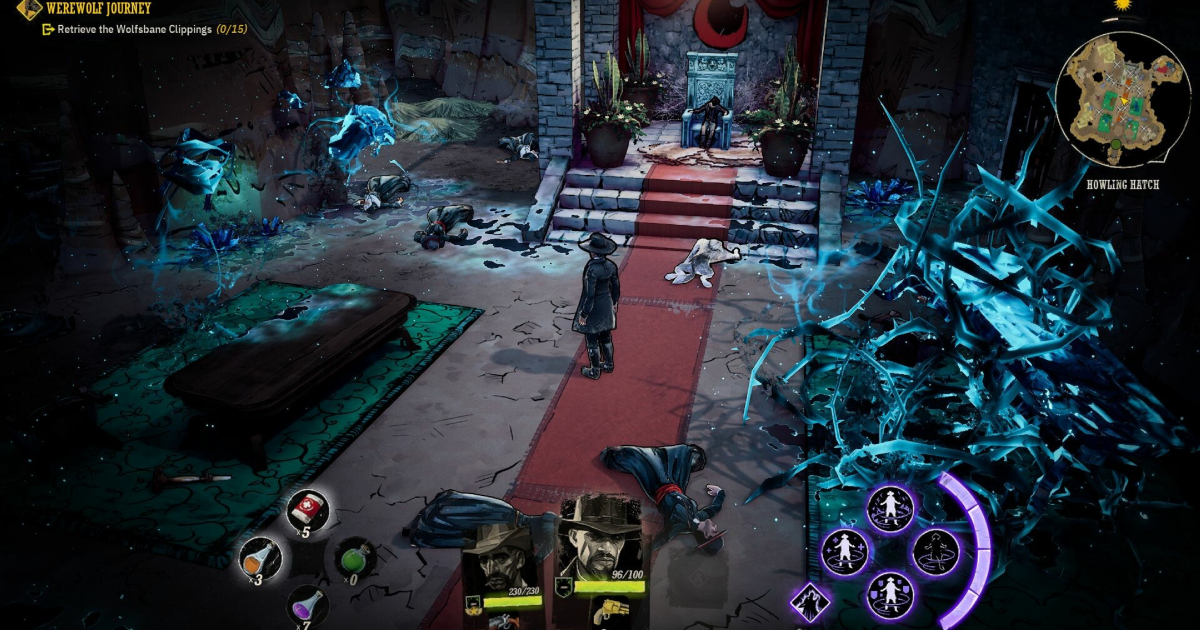
Weird West
So what’s the mindset right now for you? Are you having any déjà vus from the early days of Arkane, retracing your own steps, or is it a completely different experience for you?
Raphaël: Well, it’s very similar to the beginning of Arkane, but I’m not the same person I was 20-something years ago. So it’s a bit like New Game+: I start a new game, but my powers are different. I’m just a different person, my drive is different. I’m 52, you know.
I used to just be focused on a specific type of gameplay. I didn’t care so much for the story or some messages. Now these things matter more to me: the depth, some of the intellectual messages maybe. Me and my team did it on Weird West. And I think we’re doing this again on our next project.
There are a lot of the same people on the team. So it does feel very much like a new Arkane, with a lot of my old buddies and friends joining in. The mentality is still that of a small boutique studio trying to make the best game. That is something that hasn’t changed. Of course, we’re after money so that we can make our game — making money is a consequence of making a good game — but we’re not in it for the money if it makes sense. Games are always risky, they’re extremely hard to make; there are other ways to make money that are probably not as exhausting and hard.
And you have chosen, of course, the type of games that is worst of them all in terms of what it takes to make them.
Raphaël: Yeah, because what’s the point otherwise? If we’re going to make something we already know how to make and there is no risk, I don’t see why we’re spending four years of our lives on it. Every time it has to feel like we’re giving it our all.
We’re going to take all the risk. It’s going to be a hard game to make, but it’s going to be a great game. How can you make a fantastic project by playing it safe? It’s not going to land anywhere. So we always stretch, we always worry it’s going to be too hard, and we take crazy bets. It’s how we operate. Maybe we are thrill seekers, but it’s been the same spirit with my old company, Arkane, and now with this new one, it’s very similar.
I’m glad to hear that the spirit lives on. And I guess when the hero accepts their destiny, there’s no escaping it. Thank you for your time, it was awfully inspirational.
Raphaël: Thank you.
